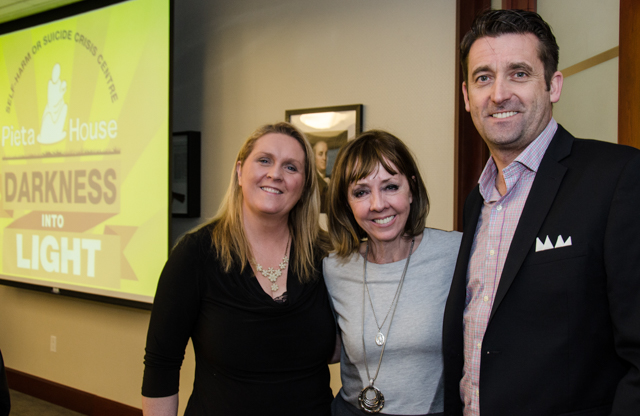Jim Reardon of Havertown was there because of Christmas 1976, the day he returned to his Dublin home after visiting friends to learn that it wasn’t because of a card game—“we were a great house for cards,” he says—that the house was teeming with people in the middle of the night. Reardon’s father had been found dead. Laid off after 50 years at the same job, he committed suicide.
Siobhan Towey Regan of Glenside was there was there for her cousin, a young man in his 20s, who also killed himself.
Joan Freeman of Dublin was there because of her sister, Catherine. A 54-year-old mother of four, she too died by her own hand.
They and more than a dozen other people from Philadelphia’s Irish community were there—in a meeting room on the 18th floor of the United Plaza Building on 17th Street in Philadelphia— on Wednesday because of an epidemic shared by their country of birth and their country of choice. They were there to meet Freeman, a psychologist who, wracked with guilt after her sister’s death, closed her private practice and spent three years researching suicide which kills 10 people a week in Ireland and is the tenth leading cause of death in the US, the fourth biggest killer of people from 10 to 34, according to the Centers for Disease Control and Prevention.
In 2006, Freeman opened the first Pieta House, which provides free one-to-one counseling to people who are considering harming themselves or taking their own lives. In 10 years, the number has grown to nine centers in Ireland (a tenth is opening soon) and one in the US, at the New York Irish Center, which launched last September.
The organization thrives on small grants from the Irish government and what Freeman described as the GWP Fund. That stands for “God will provide.” In this case, God does not work in mysterious ways. “We’re totally supported by the Irish people,’ said Freeman, a small, slight woman with a warm, therapist’s manner.
Much of the money comes from an annual 5K “Darkness Into Light” walk/run, this year on May 7, which takes place in more than 100 locales worldwide including, for the first time this year, in Philadelphia. For Siobhan Regan it will be a family affair. She and her family will be participating in Philadelphia, along with her sister-in-law in Mayo and her brother in Australia. “It won’t be the same time because of the time differences but we’ll all be doing it the same day,” she says.
Starting at 4:15 AM, “Darkness Into Light” takes participants over the finish line just as dawn is breaking, an apt symbol for the work Pieta House does. With 180 therapists, says Freeman, “we carry that person from the very darkest of places and we do carry them into the light.”
Many of the people in the room on Wednesday, some whose lives were also touched by suicide, are scrambling now to organize the run/walk, which started in Dublin’s Phoenix Park in 2008 with 400 participants and swelled to more than 12,000 last year. “I don’t care if you raise $2,” Freeman told them. “If someone only has $5 to offer, let them run! If you can expose more people to the name of Pieta House, you’ve done a really good job.”
Freeman wants to take Pieta House’s unusual model—15 sessions with a certified therapist is totally free, no insurance required, in a beautiful, comforting setting—not only to every corner of Ireland but all across the US and Canada too. The first step, she says, is always to raise awareness of suicide as a public health concern. And, most important, to speak its name out loud.
There’s still a stigma attached to mental illness, and to suicide in particular. It’s the ultimate failure, for both the one who takes his own life and the ruptured family left behind with often unremitting shame, regret and guilt.
Jim Reardon says it took him many years to “deal with it. It’s a bear to live with,” he says. “You always wonder, ‘Was there something I could have done?’ I know now there wasn’t, but. . . .” While he has largely healed, something remains. He has never told his own children how their grandfather died. “That’s why this is so important,” he says.
When her own sister died, Freeman admits she was brutal on herself. There she was, a psychologist in private practice, who regarded her sister’s deep emotional distress in way “typical of an Irish Catholic—ignoring it, thinking, ‘oh, it will pass, she’s attention-seeking’ when what she was really doing was crying for help.”
She’s made sure that the response of Pieta House is total compassion. “The first thing we ask people who come to us is why they want to die,” explains Freeman. “The second thing we ask them is why they want to live so that their reason for living moves to the forefront of their minds. Our therapists become very close to the clients they’re counseling. We offer them 15 sessions and they can come back every day. Usually by the eighth session, they’re through the crisis.”
There’s no long-term commitment involved, no years of therapy. “We don’t focus on what happened in the past. We focus on the now and the future,” she says. And while you don’t have to be Irish to use Pieta House’s services, there’s an unmistakable Gaelic flavor to the place. “When you come into one of our centers, like it or not, we give you a cup of tea,” says Freeman, laughing.
You can register for the Philadelphia May 7 Darkness Into Light Walk/Run here. The event will start at Lloyd Hall, behind the Art Museum, and end on the Art Museum steps overlooking the Parkway. The local walk also has a Facebook page.

